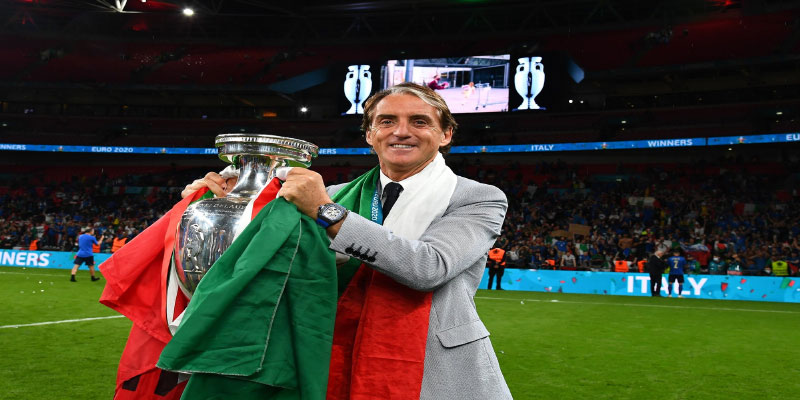
Roberto Mancini: The Brilliant Football Coach with a Winning Strategy
Roberto Mancini is widely recognized as one of football’s most innovative and successful coaches. With a career spanning both playing and managing, Mancini has consistently demonstrated dedication and a deep passion for the sport. His coaching style, marked by tactical brilliance and adaptability, has led to significant achievements. Explore how his influence extends beyond tactics, shaping teams and players at every stage. For those seeking expert insights into football coaching, platforms like hello88 provide valuable resources for enthusiasts.
Introduction to Roberto Mancini
Roberto Mancini’s name resonates within the football community as a paragon of excellence and innovation in coaching. Born on November 27, 1964, in Jesi, Italy, Mancini transitioned seamlessly from a gifted player to a managerial mastermind. His understanding of the game, coupled with his strategic acumen, enables him to navigate the complexities of football at the highest level. This blog post aims to provide an in-depth analysis of his biography, career journey, coaching style, notable achievements, and future prospects.
Biography and Career Journey
Roberto Mancini’s early years revealed a passion for football that would shape his destiny. Growing up in a small town in Italy, he honed his skills with local clubs before making his professional debut with Bologna at the tender age of 17. His next significant step came when he joined Sampdoria, where he enjoyed immense success, ultimately becoming the team captain.
Mancini’s playing career was marked by numerous accolades, including winning the Serie A title, the Coppa Italia, and the European Cup Winners’ Cup. His time at Sampdoria laid the foundation for his coaching philosophy, emphasizing teamwork, resilience, and tactical discipline. After retiring as a player, Mancini ventured into coaching, starting with a role at Fiorentina before embarking on a remarkable journey through various clubs, including Lazio, Manchester City, and Inter Milan.
Early Life and Influence
Roberto Mancini’s upbringing in Jesi played a crucial role in molding his approach to football. He was exposed to the regional youth leagues, where he learned the importance of hard work, diligence, and sportsmanship. Influenced by legendary figures within Italian football, Mancini developed a keen understanding of the game during his formative years.
His father, Aldo Mancini, who worked as a butcher, instilled values of perseverance and tenacity in Roberto from a young age. These qualities not only shaped him as a player but also became integral to his identity as a coach. The emphasis on discipline and professionalism permeated his coaching methods and created a distinctive leadership style.
Transition from Player to Coach
After hanging up his boots, Mancini wasted no time in pursuing a managerial career. His first significant role came at Fiorentina, where he faced considerable challenges but demonstrated his capacity for strategic thinking and team management. Despite the obstacles, Mancini’s potential as a leader began to shine through.
Mancini’s transition to coaching was smooth, owing largely to his extensive experience as a player. He understood the dynamics of motivation and player management, which allowed him to build rapport with his squads. His tenure at Fiorentina set the stage for further opportunities, leading to a successful stint at Lazio, followed by his landmark achievement with Manchester City.
Clubs He Has Managed
Throughout his illustrious career, Roberto Mancini has managed several high-profile clubs across different leagues, each contributing to his evolving coaching philosophy. From Serie A to the English Premier League, Mancini has showcased his ability to adapt and succeed in diverse environments.
Manchester City
One of Roberto Mancini‘s most defining periods as a coach unfolded during his tenure at Manchester City. Arriving in 2009, he inherited a squad brimming with talent but lacking coherence. Mancini’s tactical genius transformed the team, guiding them to their first Premier League title in 44 years.
His approach was characterized by a blend of offensive flair and defensive solidity. Mancini emphasized ball possession while encouraging creative play, allowing key players like Sergio Agüero and David Silva to express themselves on the field. The culmination of his efforts resulted in memorable moments, including Agüero’s last-gasp goal against Queens Park Rangers that clinched the title in dramatic fashion.
Inter Milan
Following his success at Manchester City, Mancini returned to Italy to manage Inter Milan. Here, he faced the challenge of rebuilding a side that had experienced recent struggles. Leveraging his past knowledge of the club and its culture, Mancini emphasized cohesion and discipline, reinforcing the team’s competitive spirit.
His spell at Inter saw a renewed focus on youth development, as he brought emerging talents into the fray. By blending experienced stars with fresh prospects, Mancini reestablished Inter as a formidable force in Italian football, securing the Coppa Italia and establishing a strong foundation for the future.
Italian National Team
In addition to managing clubs, Roberto Mancini took charge of the Italian national team, marking a pivotal moment in his career. Appointed in 2018, Mancini set out to revitalize a squad coming off a disappointing period. His vision centered around a fluid playing style, combining attacking prowess with tactical discipline.
Under Mancini’s guidance, Italy rebounded impressively, culminating in their victory at UEFA Euro 2020. His ability to foster unity among players and create a positive atmosphere was instrumental in their success. The national team’s triumph served as a testament to Mancini’s coaching brilliance and his commitment to revitalizing Italian football on the international stage.





